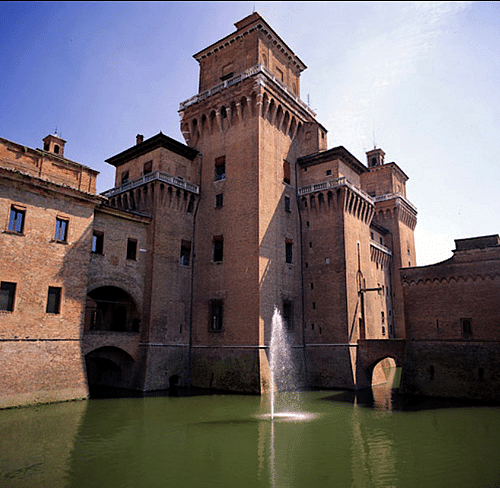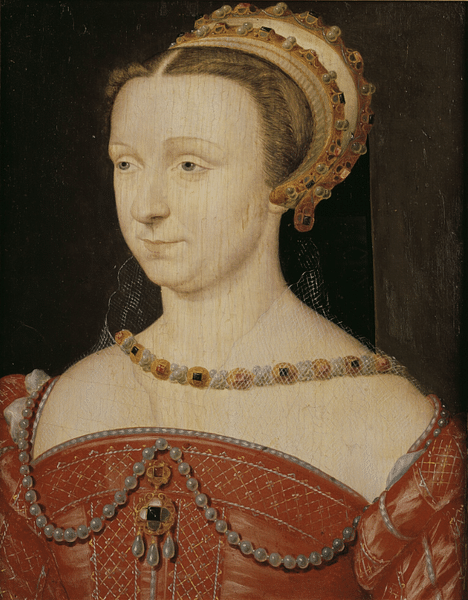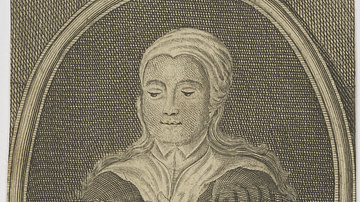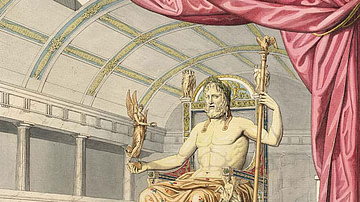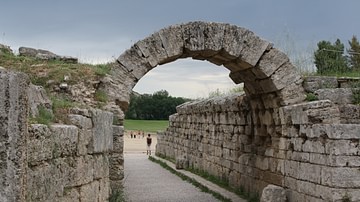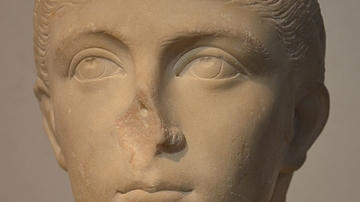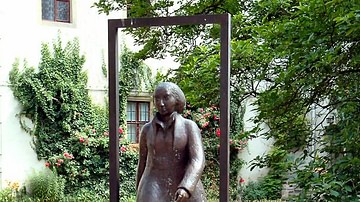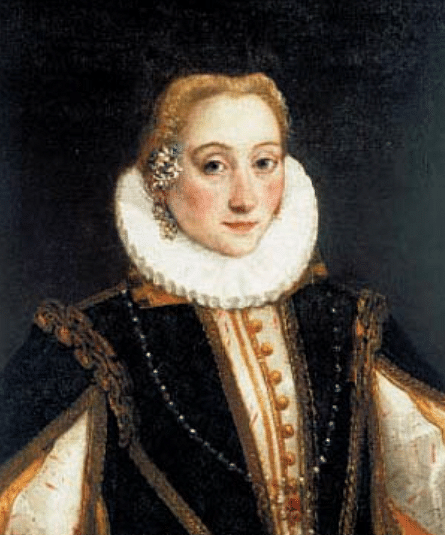
Olympia Fulvia Morata (l. 1526-1555, also given as Olimpia) was an Italian scholar, poet, and writer who sought to advance the Protestant Reformation in Italy. She was considered one of the greatest classical scholars of her time but was denied professional recognition because she was a woman though, today, her works are highly regarded.
Her father, Fulvio Pellegrino Morato (l. 1483-1548) was a scholar attached to the noble house of d’Este in Ferrara and encouraged his children’s education. Olympia showed exceptional talent in languages and was fluent in Greek and Latin by age 12. She was then selected as a companion to the young princess Anna d’Este (l. 1531-1607). In c. 1546, Olympia converted to the Protestant vision and fell out of favor at court after Anna d’Este married and moved away.
Olympia married the German physician Andreas Grundler (l. c. 1518-1555) in 1550 and moved with him to his hometown of Schweinfurt, Bavaria. Grundler supported and encouraged her intellectual pursuits, translations, and publications and Olympia corresponded freely with Reformers Martin Luther (l. 1483-1546), Philip Melanchthon (l. 1497-1560), John Calvin (l. 1509-1564), and Matthias Flacius (l. 1520-1575), among others, in her fluent Latin.
As with other female intellectuals and writers of the Reformation like Argula von Grumbach (l. 1490-c. 1564), Katharina Zell (l. 1497-1562), and Marie Dentiere (l.c. 1495-1561), Olympia was denied full recognition because of her gender but made clear, from a young age, that she would pursue her literary and philosophical interests as freely as any man. She lost almost all of her works during the Siege of Schweinfurt (1553-1554) and fled to Heidelberg where she died, possibly of plague, in 1555.
Her husband sent her surviving works to the humanist scholar Celio Secondo Curione (l. 1503-1569), a family friend, who published them after her death along with her collected works and letters. These were all forgotten until they were rediscovered in the 18th century and popularized from the late 19th century. Presently, Olympia Fulvia Morata is regarded as one of the greatest scholars, poets, and writers of her time.
Early Life & Court
Olympia Fulvia Morata was born in Ferrara, Italy around 26 October 1526 to a highly educated father who served as tutor at the court of Alfonso I d’Este, Duke of Ferrara (l. 1476-1534) and taught at the local university. Her mother’s name was Lucrezia Gozi Morata but nothing more is known of her. Olympia was one of five children, three sisters (names unknown except one, Vittoria) and a younger brother, Emilio. Their father encouraged their education even though, at this time, educating girls was considered, at best, a waste of time and, at worst, a corruptive influence.
By the time she was 12 she was fluent in Greek and Latin, enjoyed reading classical literature, and was composing her own poetry. Scholar Kirsi Stjerna cites a passage from one of her early poems in which she defines herself as a scholar and rejects the traditional roles assigned to women:
Never did the same thing please the hearts of all,
And never did Zeus grant the same mind to all…
And I, though born female, have left feminine things,
Yarn, shuttle, loom-threads, and work-baskets.
I admire the flowery meadow of the Muses,
And the pleasant choruses of twin-peaked Parnassus.
Other women perhaps delight in other things.
These are my glory, these my delight. (198)
Olympia was taught Greek and Latin (possibly also Hebrew) by two scholarly brothers – Johann and Killian Senf, friends of her father – as well as by her father himself and his friend and scholar Celio Secondo Curione. At some point her father moved the family to Venice where he taught for a few years before returning to Ferrara at the summons of Alfonso I’s son and successor, Ercole II d’Este, Duke of Ferrara (l. 1508-1559) and his wife Renee of France (l. 1510-1574). At this time, Olympia became the companion and tutor of Princess Anna d’Este.
Reformation in Italy
The Protestant Reformation in Italy did not advance as it did elsewhere owing to effective suppression and censorship of the “new teachings” by the Church at an early stage. The Dominican friar Girolamo Savonarola (l. 1452-1498), regarded as a proto reformer, began preaching against what he saw as unbiblical Church policy in c. 1490 and his works would later influence both Martin Luther and Huldrych Zwingli (l. 1484-1531) but did not have the same impact in his own country.
Savonarola was hanged and burned as a heretic in 1498 but he had sown the seeds of reform through his preaching, letters, theological works, and friendship with Ercole I d’Este, Duke of Ferrara (l. 1431-1505), father of Alfonso I, who had tried to save Savonarola from execution. After Savonarola’s death, efforts at reform stopped or went underground until the 1520’s when Martin Luther’s 95 Theses and some of his letters were translated into Italian. Even then, however, Church authorities were quick to seize Lutheran literature, burn it, and execute anyone distributing it.
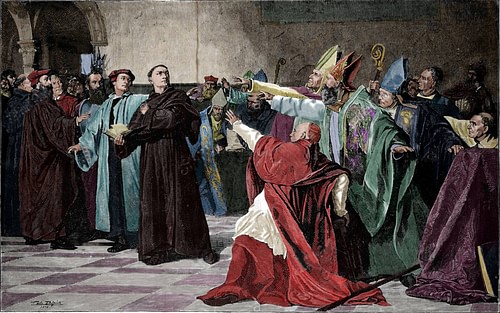
Ercole II did not share the sentiments of his grandfather toward reform and remained a devout Catholic but his wife Renee, an intellectual with an interest in scripture and philosophy, entertained a number of reform-minded scholars and writers at court, including John Calvin. Renee was responsible for distributing Calvin’s Institutes of the Christian Religion, one of the most significant works by a Reformer, and encouraged religious debate and discussion. Olympia and Anna were encouraged by Renee to attend these debates and, through them, Olympia became increasingly interested in reading scripture. Stjerna comments:
Olimpia benefitted from the cultural life at the court and her association with erudite men who taught her and those she met through her father. She absorbed knowledge and influences not only from books but also from stimulating interactions with learned individuals interested in new ideas and religious reform. Increasingly, scripture became her primary source of interest and the main object of her work. The court at Ferrara nourished cultural life and, under the wings of the Duchess Renee, it formed the hub of the reformers’ circle and a safe haven in which persecuted French Huguenots and other `dissenters’ might convene. (199-200)
In c. 1546, Olympia converted to the Protestant vision but then had to leave court and return home due to illness. She returned to court only to leave again when her father became ill and remained away until after his death in 1548. When she again returned, the earlier spirit of inquiry at court had been suppressed. Anna d’Este had been married to Francis, Duke of Guise (l. 1519-1563) and moved to France while Ercole II had initiated the Inquisition of Rome at Ferrara to root out heretics, suppressing Renee’s intellectual salons. Olympia’s former freedom to read and write as she pleased was strictly curtailed and, as Anna was gone and there was no longer an official need for her presence, she was largely ignored though, at the same time, since Renee was under suspicion of heresy, Olympia became suspect as well.
Isolation & Marriage
Olympia remained at court, seeing little of Renee who, at this point was essentially under house arrest for her encouragement of reform (though she had not yet been officially accused of heresy) and spent her time tutoring her younger sisters and brother. Stjerna comments:
She wrote to Curione that she was deserted by her “princess” and that she was not allowed even to read the Old and New Testament. She felt she was “plunged into abyss” and left the court where she felt her salvation was imperiled. (201)
It is unclear where she went after leaving the court, but she concentrated on biblical studies, setting aside her long devotion to works of classical literature. The Reformed vision of Christianity as a living, vibrant, personal relationship with a loving God inspired a greater interest in the Bible than any other work and she began (or continued) a series of translations of the psalms, religious dialogues, and commentaries on religious subjects while also writing some of the letters that make up the majority of her extant work.
In 1550 she married the physician Andreas Grundler of Bavaria whom she met in 1549 when he arrived in Ferrara to finish his degree in medicine. As Olympia understood little German, it is thought the two conversed in Latin – the same language she used in correspondence. The marriage was a love match, not prearranged, and the couple were devoted to each other. Grundler was also a Protestant but, unlike many Protestant men of the time, was not threatened by an intellectual wife who conversed on biblical subjects. Grundler encouraged her studies and her writing and allowed her again the freedom of expression she had known at Renee’s court. Stjerna writes:
Just as her parents had supported Olimpia’s ambition for learning, her husband and the institution of marriage provided her with continued protection. Both society and the Church found the emancipated, educated women who shunned marriage and slipped away from male control the most troubling of their sex. There was always the possibility that these intellectually independent women would extend the realm of their self control beyond the mind to the body, and seek to determine their entire social role for themselves. In an age when learning and chastity were seen as incompatible in women, and where undomesticated learned women posed a threat, the role of a Protestant wife may have actually protected Olimpia in her “anomalous position as a married scholar” and her interests. This was not necessarily the case for most women, to whom marriage meant an end of intellectual pursuit: to marry and to study was not a probable combination for a woman. Olimpia was exceptional in this regard; exceptional also in the passion of her determination to be a scholar. (202-203)
Many educated women of Olympia’s time endured challenges at home as well as public enmity for their works. Argula von Grumbach’s husband rejected her Protestant faith and theirs was a strained marriage while Marie Dentiere’s husband seems to have felt overshadowed by his wife and, though he defended her against others, it is unclear whether he supported her. Grundler, on the other hand, fully supported Olympia and assisted in her work.
Works & Evangelism
Olympia’s extant works consist of 52 letters, translations of seven psalms and parts of Giovanni Boccaccio's Decameron, two dialogues, eleven poems, an explication of Cicero’s Stoic Paradoxes, and In Praise of Mucius Scaevola. Her work on Scaevola, the Roman youth said to have defied the Etruscan King Porsena at the Siege of Rome of 508 BCE, focuses on personal courage and suffering for a noble cause, two themes that run through her other works as well as her letters.
Her dialogues are dedicated to her lifelong friend Lavinia della Rovere and feature Lavinia as one character, Philotima (“she who loves honor”) and herself as Theophila (“she who loves God”) in a discourse encouraging faith in Christ as the most important aspect of one’s life. These works, which follow the classical model of Greco-Roman dialogues, emphasize courage in confronting obstacles in the belief that God will meet the believer halfway and assist in overcoming any challenge.
Olympia’s fame rests largely on her letters, however, which encourage others in their faith, expound upon theological issues, and advocate for activism in establishing the Reformation in Italy. In 1553 she wrote to Reformer Matthias Flacius asking him to translate Luther’s works into Italian and offering to assist. She kept up a correspondence with Anna D’Este and wrote her asking for her intervention in her husband’s persecution of the Huguenots of France. She also wrote to her sister Vittoria, Curione, and others discussing affairs of the day and the importance of daily devotion to remain centered in one’s faith.
By c. 1550, the Reformation had taken firmer root in Italy and, although it never became the driving force there that it did in Germany and elsewhere, attracted a significant following which Olympia’s advocacy may have contributed to (though this claim is challenged). She read the works of Luther, Calvin, and Zwingli, corresponded with the first two, and became convinced of the truth of predestination as it assured one that, in spite of appearances to the contrary, God was always in control. Her faith in the love of God and the claim that everything happens for a reason would be tested in Schweinfurt, as she later remarked in letters, but she refused to abandon God even when it seemed that God had abandoned her.
Schweinfurt & Heidelberg
Olympia, Andreas, and Olympia’s brother Emilio arrived in Schweinfurt at some point in 1550. As they traveled through Germany to their new home, her fame as a scholar preceded her and she was given books as gifts by other scholars and assistance in travel. Once they had set up house in Schweinfurt, Olympia resumed her work in translation, tutored Emilio in classical literature and the Bible, and continued her daily correspondence. Andreas assisted her in her work and set her translation of the psalms to music.
In 1553, Schweinfurt was invaded by the forces under Albert Alcibiades, Margrave of Brandenburg-Kulmbach (l. 1522-1557) in the course of the Second Margrave War (1552-1555). Alcibiades’ troops pillaged the town and then fled from the advancing army of Maurice, Elector of Saxony (l. 1521-1553), who fired the city. Olympia and her family had been reduced to hiding in a wine cellar during the conflict and now joined with other citizens to flee the city. Scholar Rebecca VanDoodewaard writes:
The people pressed to the gates for escape, only to be driven back. Some made their own funeral preparations at home. Some fell on their knees, begging in vain for mercy. Others crowded in the church as a place of safety, only to die as the building collapsed in the fire. Olympia and her family were drawn into the crowd that was surging toward the church where they would have died, when an enemy soldier told them to flee or be buried under the ashes of the town. They left their home with nothing. (104)
It seems they may have left with only what they were wearing and some of Olympia’s manuscripts but most of her work was lost to the fire and any they had saved were lost afterwards. They were accosted outside the city and Andreas held for ransom but, when Olympia explained she had no money and they had lost everything, he was released but their clothes were taken. They traveled miles, barefoot and nearly naked, until they reached the estate of the Duke of Erbach who took them in and cared for them.
The duke was sympathetic to the Reformation and the three refugees who had shown up at his door and secured Andreas a position at the University of Heidelberg. Olympia’s health had failed on their journey, and she remained bedridden for over a month until strong enough to travel. The family arrived in Heidelberg in August 1554 and resumed their lives as Andreas lectured at the university and Olympia tutored Emilio while working on translations and returning to her correspondence. When friends and admirers learned she had lost all her books and manuscripts, they sent her replacements and copies of her work.
Her letters from this time consistently touch on her failing health, impending death, and her expectation of eternal life with Christ. In one, she writes, “I long to be dissolved, so great is the confidence of my mind, and to be with Christ in whom my life flourished” (Stjerna, 207). In a letter to Curione, she writes, “My bodily strength is gone. I have no appetite for food” and mentions a persistent fever and constant congestion and pain that prevented her from sleeping but still she made the effort to encourage him in his faith, as she did with others. She died, possibly of plague or tuberculosis, in October 1555 at the age of 29.
Conclusion
Andreas sent her works to Curione who had them published at Basel but Olympia’s husband, and Emilio, did not live long after her death, both succumbing to the plague. The three are buried in St. Peter’s Church cemetery in Heidelberg. Olympia’s reputation as a scholar of note continued but she was forgotten by the 17th century and only rediscovered in the 18th when the German poet Goethe (1749-1832) popularized them in his work. Her writings were translated from the late 19th century and, today, she is recognized as one of the most important voices of the Reformation era.
Olympia Fulvia Morata’s works, especially her letters, have found an audience in the present day because of the depth of her faith, her commitment to the well-being of others, and her vast knowledge which she freely shared. Stjerna cites the scholar Rabil, noting:
Learning was not an ornament worn by Morata; it was her identity. She was oppressed throughout her brief adult life by events that might have deterred a lesser spirit…but nothing silenced her pen. (211)
As with all the female authors and activists of the Reformation, Olympia was barred from full recognition because of her sex but continued her work regardless of what anyone else thought she should be doing. Had she lived longer, she may have even found a place among the faculty of the University of Heidelberg which honors her today through the Olympia Morata Program, providing funding for female postdoctoral researchers. A gymnasium in Schweinfurt was renamed for her in 1956 and her works have been translated into several languages, resonating with people now as they did with those who first read them.
